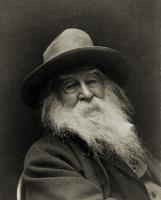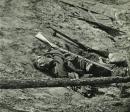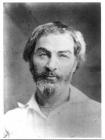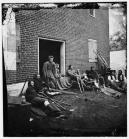Beat! beat! drums! - blow! bugles! blow!
Through the windows - through doors - burst like a ruthless force,
Into the solemn church, and scatter the congregation,
Into the school where the scholar is studying;
Leave not the bridegroom quiet - no happiness must he have now with his bride,
Nor the peaceful farmer any peace, ploughing his field or gathering his grain,
So fierce you whirr and pound, you drums - so shrill you bugles blow.
Beat! beat! drums! - blow! bugles! blow!
Over the traffic of cities - over the rumble of wheels in the streets;
Are beds prepared for sleepers at night in the houses?
No sleepers must sleep in those beds --
No bargainers bargains by day - no brokers or speculators - would they continue?
Would the talkers be talking? would the singer attempt to sing?
Would the lawyer rise in the court to state his case before the judge?
Then rattle quicker, heavier drums -- you bugles wilder blow.
Beat! beat! drums! - blow! bugles! blow!
Make no parley - stop for no expostulation,
Mind not the timid - mind not the weeper or prayer,
Mind not the old man beseeching the young man,
Let not the child's voice be heard, nor the mother's entreaties,
Make even the trestles to shake the dead where they lie awaiting the hearses,
So strong you thump O terrible drums - so loud you bugles blow.
Through the windows - through doors - burst like a ruthless force,
Into the solemn church, and scatter the congregation,
Into the school where the scholar is studying;
Leave not the bridegroom quiet - no happiness must he have now with his bride,
Nor the peaceful farmer any peace, ploughing his field or gathering his grain,
So fierce you whirr and pound, you drums - so shrill you bugles blow.
Beat! beat! drums! - blow! bugles! blow!
Over the traffic of cities - over the rumble of wheels in the streets;
Are beds prepared for sleepers at night in the houses?
No sleepers must sleep in those beds --
No bargainers bargains by day - no brokers or speculators - would they continue?
Would the talkers be talking? would the singer attempt to sing?
Would the lawyer rise in the court to state his case before the judge?
Then rattle quicker, heavier drums -- you bugles wilder blow.
Beat! beat! drums! - blow! bugles! blow!
Make no parley - stop for no expostulation,
Mind not the timid - mind not the weeper or prayer,
Mind not the old man beseeching the young man,
Let not the child's voice be heard, nor the mother's entreaties,
Make even the trestles to shake the dead where they lie awaiting the hearses,
So strong you thump O terrible drums - so loud you bugles blow.
envoyé par Dead End - 13/11/2012 - 15:09
Questa non è in nessun modo una canzone contro la guerra, anzi Whitman vuole che più persone possibili partecipino alla guerra civile americana, che lui vede come unica maniera per portare cambiamento. Sa benissimo che la guerra è orrore, "massacre" and "death" (in quegli anni vive a Washington, dopo che il fratello George è stato ferito a una guancia proprio combattendo; fa anche l'infermiere volontario negli ospedali militari della zona), ma crede che quello sia l'unico modo per assicurare unione e stabilità all'intera America, che lui ama e non vuole si disgreghi per disordini intestini che la guerra avrebbe risolto.
Il suo messaggio si capisce benissimo dalla seconda stanza della poesia, in cui chiede ai tamburi e alle trombe militari di suonare più forte qualora vi fosse qualcuno che ancora non li ha sentiti, perché sentirli vorrebbe dire prendere coscienza della guerra e prenderne parte.
Il suo messaggio si capisce benissimo dalla seconda stanza della poesia, in cui chiede ai tamburi e alle trombe militari di suonare più forte qualora vi fosse qualcuno che ancora non li ha sentiti, perché sentirli vorrebbe dire prendere coscienza della guerra e prenderne parte.
FrancescaGioco - 6/2/2016 - 10:30
Cara Francesca, mi sa proprio che tu abbia ragione.
E' qui il mio amico Dead End - che conosco molto bene - ad aver preso un grossissimo granchione: questa è proprio un'esortazione alla guerra, e non giustifica nulla il fatto che l'autore fosse nel campo nordista e, quindi, antischiavista...
Siccome succede a volte che certe canzoni vengano inserite senza essere state prima comprese fino in fondo, e però mi dispiace che siano cancellate senza che si dia conto degli interventi che ne hanno rivelato la vera natura, propongo agli admins un percorso "Granchioni" in cui far confluire gli inserimenti sbagliati come questo... Sarebbe anche un bello spaccato sull'evoluzione nel tempo delle CCG/AWS...
Saluti
E' qui il mio amico Dead End - che conosco molto bene - ad aver preso un grossissimo granchione: questa è proprio un'esortazione alla guerra, e non giustifica nulla il fatto che l'autore fosse nel campo nordista e, quindi, antischiavista...
Siccome succede a volte che certe canzoni vengano inserite senza essere state prima comprese fino in fondo, e però mi dispiace che siano cancellate senza che si dia conto degli interventi che ne hanno rivelato la vera natura, propongo agli admins un percorso "Granchioni" in cui far confluire gli inserimenti sbagliati come questo... Sarebbe anche un bello spaccato sull'evoluzione nel tempo delle CCG/AWS...
Saluti
Bernart Bartleby - 6/2/2016 - 14:03
Mi stavo preparando a contribuire la traduzione tedesca ma poi ho riscoperto l'intervento di Francesca Gioco che contestava - sensatamente - l'inserimento di questa poesia di Whitman tra le CCG...
Chedo ai perfidi Admins di esprimersi in proposito, non appena possibile.
Saluti
Chedo ai perfidi Admins di esprimersi in proposito, non appena possibile.
Saluti
B.B. - 15/1/2018 - 14:18
Commento rapido sulla poesia che dovrei presentarla.
Piccolo_ragazzo_di_provincia - 18/1/2019 - 09:47
×
![]()








Versi di Walt Whitman, dalla raccolta “Drum Taps” pubblicata nel 1865
Musica di Kurt Weill, da “Three Walt Whitman Songs” del 1942, cui Weill aggiunse Come Up From the Fields Father nel 1947.
Testo trovato su The Lied, Art Song and Choral Texts Archive
L’orrendo, assordante rumore della guerra che soverchia ogni cosa, anche le suppliche dei vecchi, le preghiere delle madri, persino il silenzio dei morti…